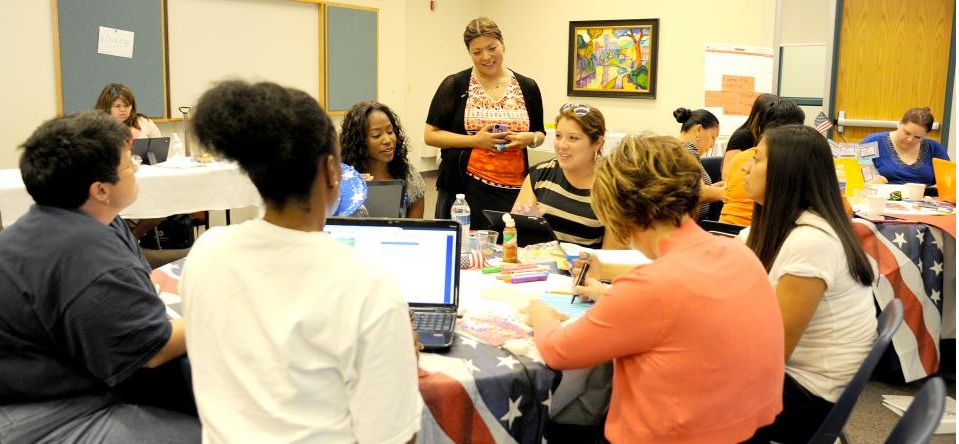12.5 Team teaching
![]()

![]()
There is no easy solution to the problem of reducing class size to numbers that will ensure all students can be helped to develop the knowledge and skills needed in a digital age. Whatever the course design, face-to-face, blended or fully online, large numbers of students per instructor limits what is possible pedagogically.
However, there are a number of successful approaches to re-designing these large introductory courses of 1,000 students or more (see for instance the National Center for Academic Transformation‘s course redesign). One solution that could be adopted is the following:
- create a team to design, develop and deliver the course; the team will include a senior tenured professor, four adjunct professors, and a similar number of TAs, plus an instructional designer and web/multimedia designer;
- the senior professor acts as a teaching consultant, responsible for the overall design of the course, hiring and supervising the work of the adjuncts/TAs, and designing the assessment strategy/questions and rubrics, in consultation with the rest of the team;
- nearly all content is provided online;
- students work in groups of 30, and each of the adjuncts is responsible for several student groups;
- each adjunct acts as the day-to-day link for each of the 30 students in each of the three or four groups they are responsible for, each adjunct helped by a TA;
- students do both individual and group work such as projects, problem-solving;
- students participate in ongoing online discussion forums, 30 students to a group, under the moderation of an adjunct or TA;
- the senior professor meets for one hour a week with a different group of 30 students three times a week face-to-face or synchronously; this means that every student gets at least one hour of personal interaction with the senior professor during the semester;
- adjuncts where possible meet once a week with one or two groups on campus or synchronously, as well as monitoring the online discussion forums;
- adjuncts and TAs mark assignments, following rubrics decided earlier, and the senior professor monitors and calibrates the marking between instructors.
Whatever detailed design is done, these large courses should have a clear business model to work with, which basically provides an overall budget for the course, that includes the cost of tenure track and adjunct faculty and TAs, and takes account of the students numbers (more students, more budgeted money), but allowing the senior professor to build the team as best as possible within that budget. Adjuncts would receive a briefing on responsibilities, online mentoring, assessment marking, for which they would be paid in addition to or as part of their teaching contract.
Ideally though the organization of teaching should not result in such very large classes, if at all possible. However, the principle of team teaching should be considered for all classes with more than 30 or so students.
Activity 12.5 Designing a team approach
1. Assume you have a class of 1,600 students for which you are responsible. You have the resources to hire two adjunct faculty and six TAs. How would you design the class?

